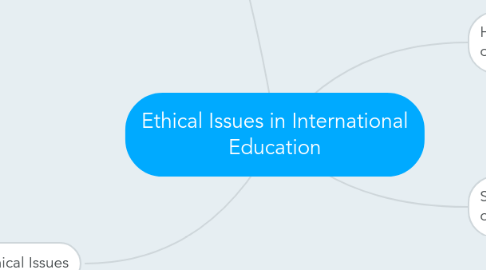
1. Bibliography
1.1. Oord, L. V. (2007). To westernize the nations? An analysis of the International Baccalaureate's philosophy of education. Cambridge Journal of Education, 37(3), 375-390. doi:10.1080/03057640701546680
1.2. Vega, V., & Terada, Y. (2013). Research Supports Global Curriculum. Retrieved March 20, 2016, from http://www.edutopia.org/stw-global-competence-research
1.3. Ethics & economics in international education: It's all about the money - European Association for International Education. (2014). Retrieved March 20, 2016, from http://www.eaie.org/blog/25th-anniversary-summary/
2. Ethical Issues
2.1. What would be the ethical issues for making a curriculum international in a nation where developing international understanding was associated with supporting western culture?
2.1.1. Possible lack of home language and loss of culture. However, according to the IB website, "The IBO finds the study of one’s mother tongue essential because ‘an understanding of the nature and value of one’s own culture is a fundamental starting point for any educational programme claiming to be international’ (IBO, 2002b, p. 8)."
2.1.2. Conflict between local school community and international school community when the two should be working together for the benefit of all students in the area.
2.2. What would be the ethical issues in a nation where developing international understanding is considered a positive, but where there are many different cultural groups represented within the community with competing ideas on who is ‘right’ in the international community?
2.2.1. International education might have a western bias at the epistemological level which may, despite intentions to be international, increase culture bias (Fox, 1985; Drake, 2004).
2.2.2. How to decide on which curriculum is best?
2.2.3. How does teacher bias and their own home country affect the teachings in school?
2.2.4. Administration has bias of how schools should run based on their country of origin and employment backgrounds. Can all people be pleased while still comfortably running a school and supporting all international staff? How is this done?
2.3. Summarize your understanding of the ethical issues that may arise or have arisen in your classroom, school, community, country, etc., as a result of the implementation of an internationally based curriculum.
2.3.1. International curriculum accreditation. Is the evidence collection, proof of best practices and focus on specific IPC requirements actually best practice for the students? Are we devoting enough time to the students vs. time to the school?
2.3.2. Local community vs. international community. Both believe they are prestigious. Both view the other as not being open or wanting to develop a relationship between schools.
2.3.3. Math curriculum. What concepts should be taught to students and at what age? How do students stay caught up with their home country's standards?
2.3.4. Teachers and staff unaware of local culture. The international bubble is hard to break. Many teachers don't know the language, understand customs or way of life and have limited interactions with the local people.

